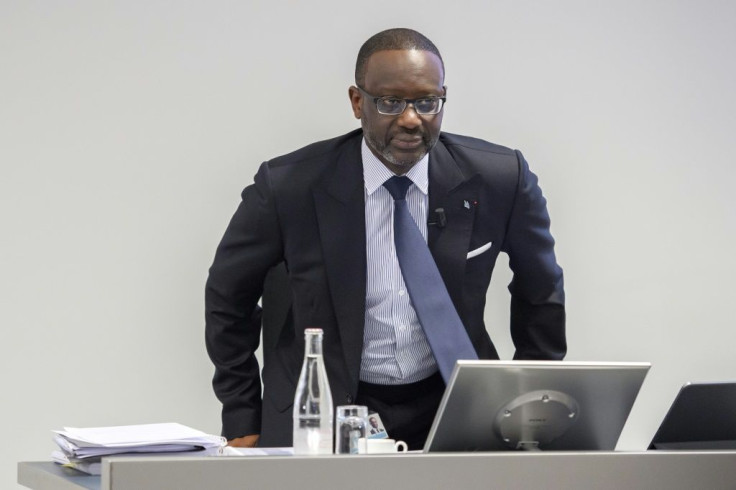Swiss Regulator Launches Enforcement Action Against Credit Suisse Over Spying Allegations

KEY POINTS
- Credit Suisse stated that it “will continue to fully cooperate” with the regulator
- Although FINMA cannot fine a bank, it has the power to ban executives from the industry
- The case involves allegations that the bank spied on one of its most prominent bankers, wealth management chief Iqbal Khan
Switzerland’s banking regulator said it has opened enforcement proceedings against Credit Suisse Group (CS) in connection with a spying scandal that led to the ouster of its former CEO.
The Swiss Financial Market Supervisory Authority, or FINMA, noted that earlier this year it appointed an auditor to investigate Credit Suisse. With that probe now complete, FINMA will now determine if the bank violated its supervisory laws.
In response to FINMA’s decision, Credit Suisse stated that it “will continue to fully cooperate” with the regulator and that it is “determined to support the effort to ensure a complete and expeditious conclusion of the review of this episode and incorporate lessons learned.”
The bank added that “the observation [spying] of employees is not part of the culture of Credit Suisse.”
Although FINMA cannot fine a bank, it has the power to ban executives from the industry, Bloomberg reported.
The case engulfing Credit Suisse involves allegations that the bank spied on one of its most prominent bankers, wealth management chief Iqbal Khan, who left for rival Swiss bank UBS Group (UBS) last summer.
As a result of the embarrassment arising from the episode, Credit Suisse ousted CEO Tidjane Thiam and replaced him with longtime executive Thomas Gottstein.
However, an internal investigation by Credit Suisse found that Thiam was unaware of the spying, and that the bank’s Chief Operating Officer Pierre-Olivier Bouee was responsible. (Bouee was fired late in 2019). It was later revealed that Peter Goerke, the bank’s former human resources chief, as well as a female U.S executive, had also been illegally surveilled.
Credit Suisse Chairman Urs Rohner (who forced Thiam out) apologized to Khan for the “wrong and disproportionate” observation activities which he admitted caused the bank “severe reputational damage.”
Thiam, who took over the Swiss bank in 2015, had stated at the time of his resignation: "I had no knowledge of the observation [spying] of two former colleagues. It undoubtedly disturbed Credit Suisse and caused anxiety and hurt. I regret that this happened and it should never have taken place."
Board Chairman Rohner nonetheless praised the Ivory Coast-born Thiam for helping to engineer a turnaround at the bank.
“Tidjane has made an enormous contribution to Credit Suisse since he joined us,” he said. “It is to his credit that Credit Suisse is standing on a very solid foundation and has returned successfully to profit.”
Before joining Credit Suisse, Thiam served as Ivory Coast's minister of planning and development until a military coup led to his house arrest. He subsequently went to Europe to become head of British financial services firms Aviva Europe and Prudential.
But the core of the conflict at Credit Suisse had to do with the relationship between Thiam and his former underling, the Pakistani-born Khan.
Thiam’s chief operating officer Bouee hired private detectives to monitor Khan, who was once an ally of Thiam.
Khan himself played a key role in Credit Suisse’s turnaround by making wealth management a core part of the bank’s business as Thiam steered it away from riskier trading activities.
However, relations between Thiam and Khan became tense and worsened after an alleged altercation between Khan and Thiam’s girlfriend at a cocktail party in early 2019. The trouble between Thiam and Khan could be traced a few years earlier when Khan bought property next to Thiam in the exclusive Herrliberg area of Lake Zurich.
Khan and his wife embarked on a long and noisy redevelopment and construction project on their property, which greatly annoyed the neighbors, including Thiam. Both Thiam and Khan complained to Rohner about each other’s conduct.
The Financial Times also reported that Khan grew frustrated at Credit Suisse as he did not gain a high profile within the bank and saw no room for advancement.
After Khan abruptly departed Credit Suisse for UBS last summer, private detectives from a firm called Investigo started watching him over fears that he would take Credit Suisse clients with him to UBS.
At one point Khan noticed the detectives tailing him and confronted them on the streets of Zurich – an episode that further embarrassed Credit Suisse.
In late September, an unnamed contractor who hired Investigo to trail Khan on behalf of Credit Suisse committed suicide.
By that point, Credit Suisse found itself in a scandal that threatened to destroy its brand and reputation.
"It's something of extreme gravity; in Zurich it is becoming a time bomb and you can feel the panic," an investor in Credit Suisse told the Financial Times at the time. "Both sides have been damaged, but especially Credit Suisse. We have said to the chairman and board they have to provide a clear outcome and explanation; whoever did wrong has to pay.”
© Copyright IBTimes 2025. All rights reserved.





















